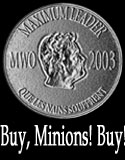Greetings, loyal minions. Your Maximum Leader has, since about 1980, traveled with some regularity down State Route 3 in Virginia from Fredericksburg to Culpeper. In recent years the drive has been going to and coming from Smallholder’s farm.
Just outside Culpeper, VA, near where Route 3 and Route 29 meet there has been a “federal facility” built into a hilside. As a young man this structure fascinated him. He eventually learned that the building was, essentially, a bunker for the Federal Reserve. In case of a Commie attack, the Fed had records, computers, and other stuff necessary for the continuing functioning of US-style capitalism. There was always a little mystery and glamor to the place.
Upon the end of the Cold War, the Fed decided they didn’t need a hardened bunker in the Virginia countryside to protect them from the Commie menace (since the Commie menace had retreated to North Korea, Cuba, and various Universities around the United States). So they vacated the space.
Now… Your Maximum Leader has always had a dream of converting an old ICBM silo into his own personal (nuke/zombie-attack proof) hardened fortress. When the Fed left their subterrainean fortress your Maximum Leader was hoping that the government would sell of the facility and he might buy it. Alas, the facility was transferred to the Library of Congress.
A few years ago, the hillside started to be excavated. Your Maximum Leader was horrified, yet fascinated and what might be going on. Eventually, the hillside was converted into a handsome (if unimaginiative) building-face and it was evident that some high-falutin government agency was moving in.
Although your Maximum Leader has known for a while that it is in fact the Library of Congress that is moving in, he didn’t know what collections they were putting in the heretofore Virginia bunker. Now thanks to the Washington Post he knows. The Library’s audio and film collections are moving to Culpeper. The piece opens:
On a hillside an hour or so southwest of Capitol Hill, the Library of Congress is moving into the newly completed home for its mammoth collection of U.S. recording and film history.
There are 6.3 million items in all: footage of Charlie Chaplin’s tottering gait, paper prints of early movies, the original negatives from “Casablanca,” the first 45-rpm record (a 1949 RCA Victor disc of the music of Johann Strauss II) and kinescope reels of NBC broadcasts from the 1940s. There’s a fine copy of Elvis Presley’s 1964 movie “Viva Las Vegas,” a complete set of Ed Sullivan’s variety shows and footage of President Franklin D. Roosevelt’s speech on Dec. 7, 1941.
The National Audio-Visual Conservation Center, which was officially turned over to the library yesterday, will bring together all of the recordings and conservation staff in a single, specially equipped facility for the first time.
The three-building campus is the largest addition to the library in 30 years. A $155 million gift from David Woodley Packard (son of the co-founder of Hewlett-Packard) and the Packard Humanities Institute made it possible. The Packard gift is the largest in the library’s 207-year history. Congress appropriated $82 million for the project.
“It assures for the first time the permanent storage and preservation and heightened access to the audiovisual heritage of the last 110 years,” said James H. Billington, the librarian of Congress.
One crucial mission of the center is to transfer precious historical images and sounds from fragile cylinders, tapes or films to digital files, which are less apt to deteriorate. The electronic versions also can be summoned by researchers at the Library of Congress buildings in Washington.
A 208-seat, art deco theater will show the films up to three nights a week. It even has an organ to accompany silent movies. While most of those visiting the center will be scholars and researchers — who will have access beginning in September — there is an audio-listening studio that will be used for exhibits, demonstrations and other public programs.
The addition sits on 45 acres and contains 415,000 square feet, about eight times the size of the White House. The inventory: 3 million sound recordings, 2.1 million supporting documents (such as screenplays and posters) and 1.2 million moving images.
Ohh! An Art Deco theatre showing movies three times a week! Although it is something of a haul from the Villainschloss, your Maximum Leader will have to partake of some viewing there.
Although your Maximum Leader is saddened by the loss of a nuke/zombie-proof bunker, he is glad to learn that our nation’s audio and cinematic history are going to be better preserved.
Carry on.


